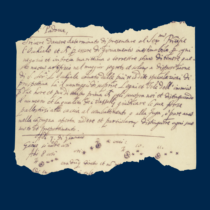News Stories

Discovering a Forgery
In 1610, Galileo Galilei made a revolutionary discovery: moons orbiting Jupiter. One of the first astronomical discoveries made using a telescope, this event was critical to reshaping human understanding of the cosmos.
Galileo drafted notes on his observations of the moons, for later publication in a work called the Sidereus Nuncius. In 1938, in a meeting that took place at U-M’s Detroit Observatory, that draft was gifted to the University, becoming a treasured holding of the University Library. Or so everyone long believed.
Now, thanks to the work of historian Nick Wilding, and the collaboration of U-M librarian Pablo Alvarez, the University’s “Galileo Manuscript” has been exposed as a 20th-century forgery.
Wilding and Alvarez discussed the purported significance of the manuscript, how its authenticity came to be questioned, and what went into the determination that it was a fake.
